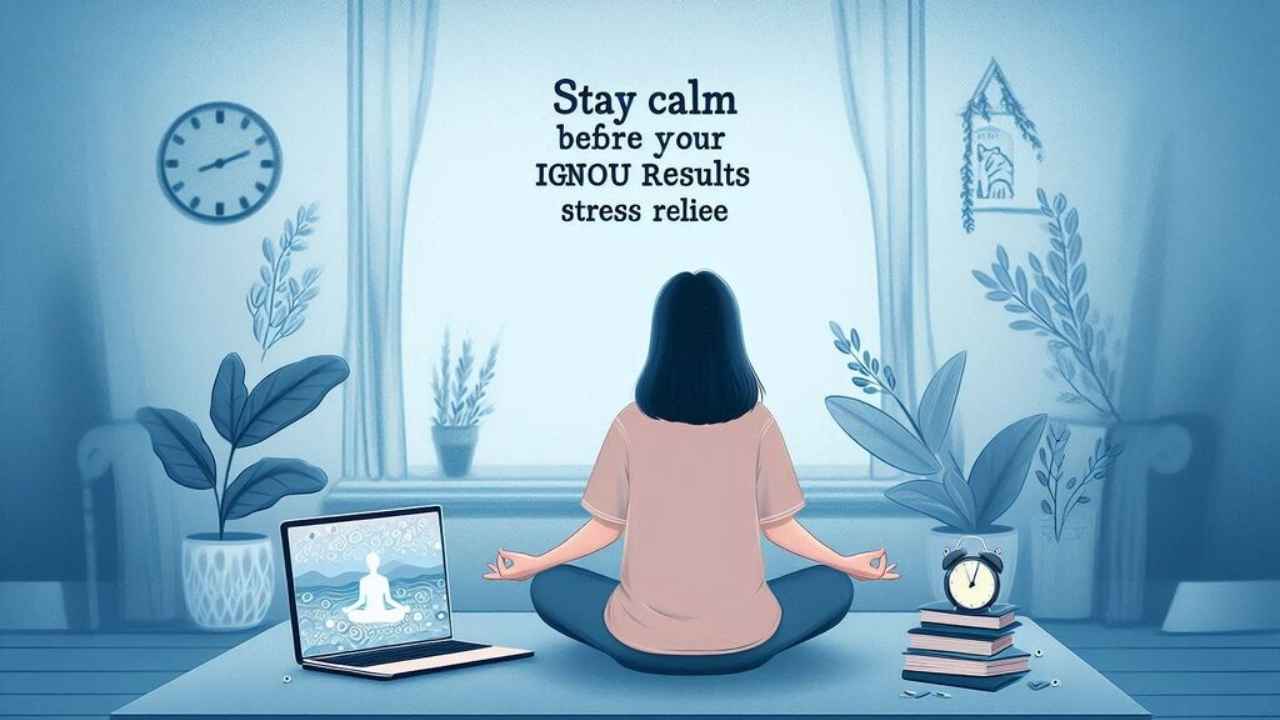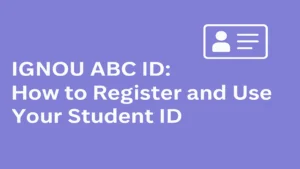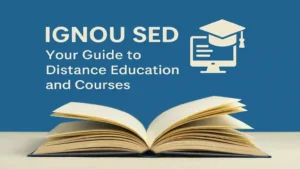Waiting for exam results can be incredibly stressful, and for IGNOU students, the pressure often feels immense. The anticipation, fear of failure, or the uncertainty of the results can affect not only your mental health but also your physical well-being. Thankfully, there are several quick stress relief techniques you can use to calm your nerves and find inner peace before your IGNOU result announcement. In this article, we’ll explore some of the most effective ways to relieve stress and stay grounded during this tense time. 🌟
Introduction: The Stress of Waiting for IGNOU Results
Understanding the Anxiety of Ignou Result Day
The period between exam submission and result day is often filled with anticipation and doubt. You might wonder if you studied enough, or if you missed out on important topics. These anxious thoughts can flood your mind, affecting both your mood and productivity. Understanding this anxiety and acknowledging it is the first step toward managing it.
Why Stress is Common Among IGNOU Students
IGNOU students are particularly vulnerable to stress because the university’s distance learning model can lead to feelings of isolation and self-doubt. With no traditional classroom environment to support you, it can be easy to fall into stress when awaiting results. The pressure to perform well while managing other responsibilities like work or family only exacerbates the issue.
The Importance of Managing Stress Before Ignou Results Arrive
Stress, if not managed properly, can lead to severe consequences such as burnout, anxiety disorders, or physical health problems like high blood pressure. It can also negatively affect your mental clarity, impairing your ability to perform well on future exams or assignments. That’s why learning effective stress management techniques before the result day is vital. 🌱
The Science of Stress: How It Affects Your Mind and Body
The Physiology of Stress: Fight or Flight Response
When you feel stressed, your body goes into a “fight or flight” mode, releasing hormones like cortisol and adrenaline. While this response can be helpful in emergencies, it can be harmful if activated for prolonged periods, as it affects your nervous system and can weaken your immune system. 🧠💥
How Stress Impacts Your Brain and Cognitive Function
Chronic stress can reduce the size of the hippocampus (the part of your brain responsible for memory and learning) and impair your cognitive function. This makes it harder to think clearly, focus, and retain information. Therefore, when waiting for results, reducing stress is crucial for maintaining mental clarity. 🧘♂️
The Physical Symptoms of Stress You Should Watch For
Physical signs of stress include headaches, muscle tension, rapid heartbeat, and digestive issues. Recognizing these signs early on allows you to take action before your stress becomes unmanageable.
How Ignoring Stress Can Affect Your Performance
The Negative Impact of Stress on Concentration
High levels of stress can affect your concentration, making it difficult to focus on important tasks. You may experience a racing mind, jumping between thoughts, or inability to sit down and focus on studying for your next course. This lack of concentration can affect your overall academic performance.
Stress-Induced Mental Fatigue and Its Consequences
Stress can lead to mental exhaustion, making it harder to stay engaged in your studies or other day-to-day activities. Over time, this mental fatigue can become overwhelming and affect your productivity, causing burnout.
Why Stress Management is Key to a Healthy Result Mindset
Managing stress before your results helps create a healthy mindset, allowing you to embrace whatever outcome comes your way. It encourages resilience, focus, and mental strength to handle challenges in a positive manner. 🌟
Effective Quick Stress Relief Techniques: Overview
Immediate Stress Relief: The Role of Short-Term Techniques
Quick stress relief techniques are designed to provide immediate relief from anxiety and overwhelm. These techniques help calm your nervous system and restore balance, enabling you to feel more centered in the moment.
Combining Quick Techniques with Long-Term Stress Management Strategies
While quick techniques are helpful, pairing them with long-term strategies like regular exercise, balanced nutrition, and a positive mindset can provide lasting results. Stress management is not a one-time fix but a continuous process.
Tailoring Techniques to Your Personal Stress Triggers
Not all stress relief methods work for everyone. The key is to identify which techniques resonate with you personally. Whether it’s breathing exercises, exercise, or aromatherapy, try a variety of methods to find what helps you the most.
Breathing Exercises: Your First Line of Defense
How Deep Breathing Reduces Stress and Anxiety
Breathing exercises are an excellent way to immediately calm your nervous system. Deep breathing triggers the parasympathetic nervous system, which helps lower heart rate and reduce feelings of anxiety. 💆♀️
The 4-7-8 Breathing Technique for Instant Calm
This simple technique involves inhaling for 4 seconds, holding your breath for 7 seconds, and exhaling slowly for 8 seconds. This pattern helps calm the mind and alleviate stress, especially before you get overwhelmed by the pressure of waiting for your results.
Alternate Nostril Breathing to Balance Your Nervous System
Alternate nostril breathing is a traditional yoga technique that helps balance the nervous system and improves focus. Simply close one nostril, inhale deeply, close the other nostril, and exhale slowly. This technique promotes relaxation and mental clarity.
Guided Breathing Exercises and Apps for Focused Relief
There are numerous apps and guided sessions available for deep breathing exercises. Apps like Calm or Headspace guide you through breathing sessions that can be particularly helpful when you’re feeling anxious. 📱💨
The Power of Meditation: Finding Inner Peace Before Results
Understanding Meditation and Its Stress-Busting Benefits
Meditation is the practice of focusing the mind and calming the body. It’s proven to reduce stress, increase mindfulness, and help with emotional regulation. Regular meditation can be a powerful tool during the stressful waiting period before your IGNOU results.
Quick 5-Minute Meditation Techniques for Immediate Relief
Even a 5-minute meditation session can significantly reduce your stress levels. Close your eyes, take deep breaths, and focus on your breath or a peaceful thought. This will help bring you back to the present moment and reduce anxiety.
The Role of Mindfulness Meditation in Reducing Anxiety
Mindfulness meditation involves observing your thoughts without judgment. By practicing mindfulness, you learn to detach from anxious thoughts about your results, allowing them to pass without affecting your peace of mind.
Using Meditation Apps to Guide Your Stress Relief
There are many apps available, like Insight Timer and Calm, that provide guided meditation for beginners. These apps can help you focus and calm your nerves quickly during times of stress. 🧘♀️📲
Physical Stress Relief: Relaxing Your Body and Mind
How Physical Movement Relieves Stress
Physical movement is an excellent way to reduce stress as it promotes the release of endorphins, the body’s natural “feel-good” chemicals. Exercise also reduces cortisol levels, a hormone associated with stress. 🏃♀️
Stretching Techniques to Release Tension in Your Body
Simple stretching exercises can help release built-up tension in your neck, shoulders, and back. Perform gentle stretches to help your muscles relax and ease any physical discomfort associated with stress.
Yoga Poses for Quick Stress Relief
Yoga combines both physical movement and breathing techniques to alleviate stress. Poses like Child’s Pose, Downward Dog, and Savasana are known to calm the mind and body. 🧘♀️
The Benefits of a Quick Walk to Clear Your Mind
Taking a short walk, preferably in nature, helps clear your mind and reduces stress. Walking stimulates the production of endorphins and helps regulate your mood.
Progressive Muscle Relaxation (PMR): Releasing Tension Step-by-Step
What is PMR and How It Works to Reduce Stress
Progressive Muscle Relaxation involves tensing and then relaxing each muscle group in the body. This technique helps release physical tension and promotes mental relaxation.
Step-by-Step Guide to Progressive Muscle Relaxation
To practice PMR, start by tensing each muscle group for 5 seconds, then release for 10 seconds. Begin with your toes and work your way up to your head, ensuring to relax each muscle after tensing.
The Science Behind PMR’s Effectiveness on Anxiety
Research shows that PMR helps lower heart rate and blood pressure, reducing overall feelings of stress and anxiety. It’s a great technique to use if you feel physically tense or overwhelmed.
Visualization: Mentally Preparing for Positive Results
How Visualization Techniques Help Calm Anxiety
Visualization involves imagining a peaceful or positive scenario in your mind. It’s a great technique to reduce anxiety and shift your focus away from negative outcomes.
Guided Visualization Exercises to Relax Before Result Day
Close your eyes and imagine yourself receiving your results, feeling calm, confident, and proud of your efforts. Visualization can also include imagining a peaceful place like a beach or a forest to calm your nerves. 🌅
Using Positive Affirmations Alongside Visualization
Pairing positive affirmations like “I am prepared and capable” with visualization helps reinforce a positive mindset. This practice boosts your confidence and reduces stress.
Aromatherapy: How Scents Can Soothe Your Nerves
Understanding Aromatherapy and Its Stress-Relief Benefits
Aromatherapy uses essential oils to enhance physical and emotional well-being. Scents like lavender, chamomile, and eucalyptus are known for their stress-relieving properties. 🌸
Essential Oils to Calm Your Nerves Before IGNOU Results
Lavender oil is particularly effective at reducing anxiety and promoting sleep. Simply inhale the scent, use a diffuser, or apply it to your pulse points.
How to Use Aromatherapy Effectively for Quick Stress Relief
For quick relief, diffuse essential oils in your room or apply them to your temples or wrists. This can instantly calm your mind and body, providing relief from anxious thoughts.
Healthy Snacks and Drinks to Calm Your Nerves
The Connection Between Diet and Stress Levels
Your diet plays a significant role in your stress levels. Nutrient-rich foods can help regulate mood, while processed and sugary foods can exacerbate stress.
Quick Stress-Relieving Foods to Add to Your Diet
Foods like almonds, dark chocolate, and blueberries are great for boosting serotonin and dopamine levels. Incorporating these into your diet can help reduce feelings of anxiety.
Hydration: How Water Helps Lower Anxiety and Stress
Dehydration can worsen stress, so drinking enough water is crucial. Hydration helps your body function better, reducing the physical symptoms of stress.
Herbal Teas and Other Natural Drinks for Instant Calm
Herbal teas like chamomile, peppermint, and lemon balm have natural calming effects. Sipping these can help you unwind and reduce tension. 🍵
Music and Sounds: The Healing Power of Relaxing Tunes
How Music Reduces Stress and Enhances Mood
Listening to calming music activates the brain’s relaxation response. Classical music, nature sounds, or binaural beats are particularly effective for lowering stress levels.
The Best Music Playlists for Stress Relief Before Results
Create a playlist of calming songs or find curated playlists on platforms like Spotify. Music helps release tension and soothe the mind.
1Nature Sounds and Binaural Beats for Calming Your Mind
Nature sounds like ocean waves, birds chirping, or rain falling are perfect for relaxation. Binaural beats, which use different frequencies to promote calmness, are another excellent option.
Laughter: The Natural Stress Reliever
The Science Behind Laughter and Stress Reduction
Laughter stimulates the production of endorphins, helping to reduce stress hormones and promote a sense of well-being.
Watching Comedy or Listening to Humorous Podcasts to Relax
Watching your favorite comedy show or listening to a funny podcast can instantly shift your mood. Laughter helps release tension and put you in a more positive frame of mind.
How Laughter Therapy Can Lower Cortisol Levels
Studies show that laughter reduces cortisol levels in the body, helping you manage stress more effectively. So go ahead—laugh it out! 😂
Journaling: Release Your Stress on Paper
How Writing Your Thoughts Can Calm Your Mind
Journaling allows you to unload your worries, clarifying your thoughts and reducing emotional tension. Writing down your feelings provides an outlet for stress.
Quick Journaling Techniques for Stress Relief Before Results
Try freewriting for 5-10 minutes to express your worries. Alternatively, write about things you’re grateful for to shift your focus from anxiety to positivity.
The Power of Gratitude Journaling During the Waiting Period
Focusing on gratitude can shift your mindset from worry to appreciation. This simple habit reduces stress and cultivates a positive outlook.
Final Thoughts: Embrace Stress-Free Waiting with Confidence
The Importance of Patience and Self-Compassion
Waiting for your results can be stressful, but practicing patience and showing self-compassion can help you navigate this time with ease.
Developing Long-Term Stress Management Habits for Future Success
Incorporating stress relief techniques into your daily life will not only help you during result time but also prepare you for other challenges in the future.
Keeping a Positive Mindset While Awaiting Your Results
Adopt a positive mindset and remind yourself that no matter the outcome, you gave your best. Trust in your efforts, and stay positive. 🌈
Conclusion: Embrace Calmness and Confidence During the IGNOU Result Wait ✨
Waiting for the results of your IGNOU exams can undoubtedly be a stressful experience, but it doesn’t have to overwhelm you. By incorporating quick and effective stress relief techniques, you can regain control over your emotions, manage your anxiety, and maintain a positive mindset during the waiting period. Whether it’s through breathing exercises, meditation, physical movement, or mindfulness practices, the key is to focus on the present moment and take proactive steps to relieve stress.
Remember, stress is a natural reaction, but how you manage it makes all the difference. By embracing these techniques, you not only reduce the impact of stress on your health but also empower yourself to stay calm and focused. Trust that whatever the outcome of your results, you’ve already gained invaluable skills in managing stress and fostering mental well-being.
So, take a deep breath, relax, and know that the wait doesn’t have to be a period of anxiety. With the right tools at your disposal, you can approach the results day with confidence, resilience, and peace of mind. 🌿
Good luck! You’ve got this! 🌟
FAQs on Stress Relief Before IGNOU Results
How long should I practice these stress relief techniques before my result?
Even practicing these techniques for 5-10 minutes a day can help reduce your anxiety and improve your mindset leading up to your results.
Can stress relief techniques help with exam anxiety as well?
Absolutely! Many of these techniques, like deep breathing and meditation, are beneficial for managing exam anxiety and stress.
How do I know which stress relief technique works best for me?
It’s all about trial and error. Experiment with different techniques to see what resonates with you and provides the most relief.
Are there any quick stress relief techniques for when I’m feeling overwhelmed?
Yes! Quick techniques like deep breathing, stretching, or a short walk can provide instant relief when stress feels overwhelming.
Can aromatherapy or music really make a difference in my stress levels?
Yes, both aromatherapy and calming music have been scientifically proven to reduce stress levels and promote relaxation.
Related Posts:
- IGNOU Assignments Evaluation 2025: What Examiners Look For
- IGNOU Assignments: How to Choose the Right Sources 2025
- Mastering IGNOU Exam Paper Solving Techniques: A Comprehensive Guide 2025
- How to Download Your IGNOU Certificates in 2025: A Comprehensive Guide
- IGNOU Maidan Garhi: A Comprehensive Guide to the Heart of India’s Leading Distance Learning University 2025




